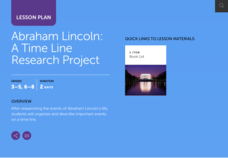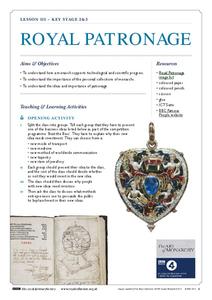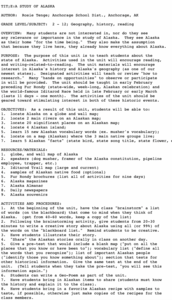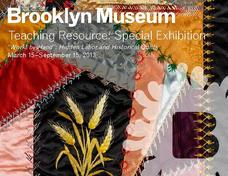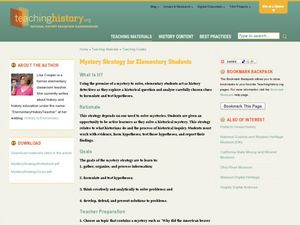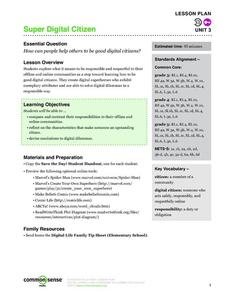Perkins School for the Blind
Personal Information
"Hi, how are you? My name is___." Seems simple enough but it's not always that easy to recall and relate factual information about yourself. Learners with multiple disabilities practice memorizing and relaying personal information about...
National Woman's History Museum
Getting with the Program
A seven-step lesson introduces the emergence of computer sciences and the contributions women made to the profession after World War II. Several science experiments offer pupils a hands-on learning experience that showcases parabolas,...
Scholastic
Abraham Lincoln: A Time Line Research Project
Though Abraham Lincoln's life was tragically cut short, it was filled with accomplishments and inspiring moments that continue to influence American democracy. Explore the ways the 16th president of the United States made his way from a...
Positively Autism
What to Expect on the 4th of July
Social stories are technically written devices used to assist children with autism in handling social situations. Print or use this social story on an electronic device to prepare your student with autism for the 4th of July. Bright...
Perkins School for the Blind
Taking Turns
For small children or learners with disabilities, learning to wait patiently and taking turns is very important. In pairs, two children with visual impairments take turns asking for, waiting for, and playing with a musical...
Peace Corps
Family
Family traditions are the focus of a lesson that explores the lives of children in India and those in your classroom. Scholars examine their own family roles and traditions, then respond to an informative text detailing a young...
BBC
The Role of a Monarch (key stage 2 and 3)
What makes a good monarch? Elementary and middle schoolers examine popular symbols of the British monarchy before designing a television advertisement about the qualities needed in a monarch. Next, they write poems using metaphors and...
BBC
Royal Patronage
The relationship between European royalty and the artists, scientists, and philosophers they support has been a building block in the artistic and technological progress throughout the world. Learn more about patronage throughout the...
Curated OER
Lesson 1: The Importance of Rules in Our Country and in Our Classroom
Explore the importance of rules in a community with the engaging first lesson of this series on the US government. To begin, children play a paper clip game that requires them to make up their own rules as they go, after which the...
Google
Be Internet Awesome
Teach the qualities of a digitally smart citizen with a set of lesson plans created by Google. Along with creating strong passwords, learners explore how to protect their privacy, when to stand up for others against cyberbullying,...
Curated OER
The Reading Boost: How Technology Bolsters Literacy
Online technologies can foster increased reading comprehension and motivate learning.
Curated OER
Teaching with Timelines
Learners create illustrated timelines to accompany the historical events and people they have studied. In this chronological history lesson, students collaborate to create timelines that are enhanced with each new historical era...
Curated OER
A Study of Alaska
Learners explore Alaska. This lesson is gearing mostly for students who live in Alaska.
Curated OER
Social Studies Board Games
Student-created board games are an effective in-class study tool.
Brooklyn Museum
"Workt by Hand": Hidden Labor and Historical Quilts
Just like a painting or the symbols on a flag, quilts can express ideas that reflect a cultural context, space, and time. The class discusses the history of quilt making throughout US history and what different types of quilts mean. They...
Curated OER
Play Ball: A Major League Review Game
Apply the game of baseball to a fun review activity. Pupils earn a "base" for each subject question that they answer correctly. This activity can be modified and used for any subject area, including math, social studies, and language arts.
Pearson
Unlocking and Exploring Folktales
Designed with many of the Common Core standards in mind, this 10-lesson unit is brimming with ELL strategies, teacher's notes, and the best of core instructional methods for teaching the common elements of folktales, and exploring...
Free Printable Behavior Charts
How Do I Respond?
Help your learners respond to feelings of anger appropriately by working with them to brainstorm fitting responses to stressful situations. This organizer includes a list of anger-causing situations paired with images, a column for an...
Curated OER
Mystery Strategy for Elementary Students
Learners of all ages solve historical mysteries. Elementary learners research historical topics by organizing information presented by their instructor, formulating hypotheses, and considering solutions to mysteries presented about...
US Department of Agriculture
Agriculture Counts
Agricultural survey and the documentation of livestock or goods was the basis for the first written language. Youngsters discuss sorting and counting, and how these skills have been used for thousands of years. They accent their class...
Curated OER
Games around the World
There are three little words every teacher is just dying to hear; investigate, discuss, and play. Kids love those words too, and they'll love finding out what types of things children did for fun long ago. As homework, they interview...
Common Sense Media
Super Digital Citizen
Teach your charges how to become responsible digital citizens with superheroes! Start out with a brief class discussion about what acting safely, responsibly, and respectfully looks like. Next, have each pupil create their own digital...
Curated OER
Greek Story Vases
There are so many ways to tell a story! Develop visual storytelling skills while facilitating an understanding of Greek art and culture. Learners design Greek style images to tell a story through art. They add their designs to Styrofoam...
K12 Reader
African American Inventors: Patricia Bath
Young readers practice their comprehension skills by responding to a series of text-based questions on a passage about Patricia Bath, the first black woman medical doctor to receive a patent.


